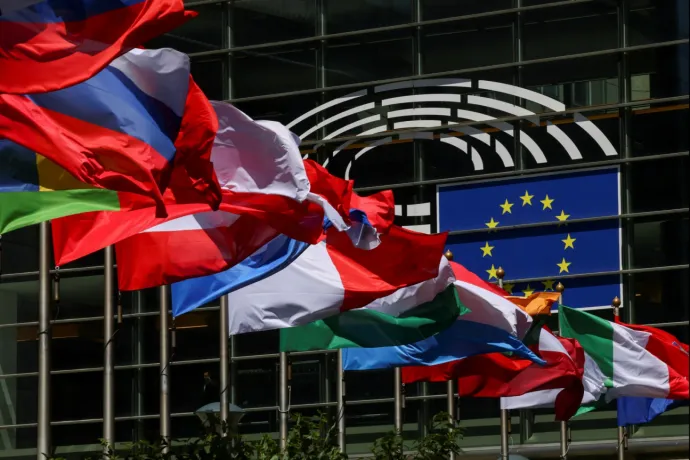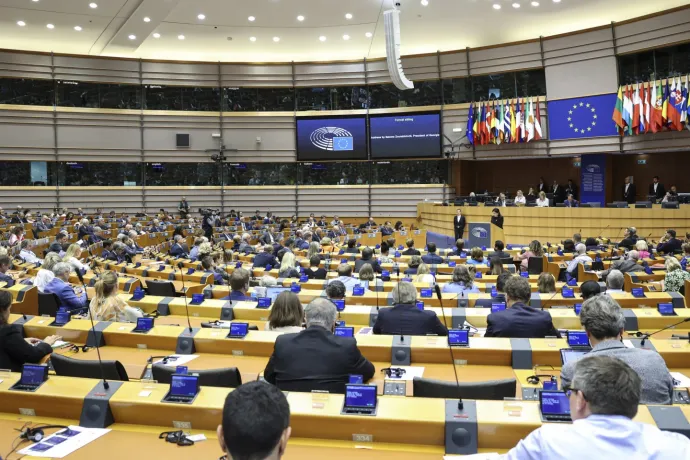
Hungary was the topic of discussion in the European Parliament again on Wednesday afternoon, as MEPs debated a motion for a resolution. During the debate, they assessed, among other things, the state of the rule of law, the freezing of EU funds – and the Hungarian government's suitability to hold the EU presidency in 2024.
The MEPs who tabled the resolution said Hungary was unfit to take over the rotating presidency of the EU Council next July because of breaches of the rule of law. They say it is worrying that the Hungarian government could take over the post for six months while there is an Article 7 procedure against it – not to mention its friendly relations with Vladimir Putin's Russian regime.
While there are no legal means that MEPs have beyond a resolution, some practical means have been suggested – we wrote more on that here. Ultimately, it is up to the Member States to decide whether the Hungarian government can go through with the presidency, and some Member States have already expressed their concerns – we have written more about this here.
The resolution will be voted on by MEPs on Thursday after the debate on Wednesday afternoon.
The Commission says the ball is in the Hungarian government's court
The presidency of the EU Council rotates every six months, with Sweden currently holding the rotating presidency. Swedish Minister for Rural Affairs and Development Peter Kullgren represented the European Council in the parliamentary debate: "Protecting our common European values is more important than ever," Kullgren said, stressing that the Swedish Presidency has so far kept the rule of law and fundamental rights at the top of the agenda.
"We have the means to defend fundamental values and we will defend them, if necessary, in a constructive dialogue with the member state concerned," the minister said, adding that the Article 7 procedure had also been discussed with the Hungarian government on Tuesday in the EU General Affairs Council.
Kullgren said that the EU Council was ready to act as a mediator between the European Commission and the Hungarian government on the freezing of EU funds, but that it was ultimately up to the Commission to decide whether it believed the government had properly fulfilled the conditions for the funds to be mobilised. Twenty-seven "super-milestones" have been set by the Commission for Budapest, but so far only some of these have been met by the Hungarian government, budget commissioner Johannes Hahn pointed out during Wednesday's debate.
“We are in an ongoing dialogue with the Hungarian government and we have clarified to them the steps to be taken to access the funds. The government sent its proposals to the Commission on 23-24 May – we are examining the points and we will try to give feedback as soon as possible.”
– Hahn said. "Indeed it is true that we need to complete the procedures within two months to ensure that the resources of the foundation-run universities are guaranteed for the 2023/24 academic year," the Commissioner added, stressing that the procedure is a multi-round one, so the Hungarian government's case may run past the deadlines. “Everyone was aware of this, no one can say that we didn't provide advance notice.”
Justice commissioner Didier Reynders said that while the Hungarian government had made progress in the process with the omnibus legislation on judicial reform, it only affected a few points out of the 27. He says the aim is to ensure that all the other points are met before the funds can be released. “We are fully committed to ensuring that the rule of law is also fulfilled in Hungary and that all the criteria that we have set are met.”
Mr Orbán, what is left of the old freedom fighter?
After representatives of the Commission and the Council, the MEPs spoke – and, as has been the case in the past, the speeches were divided into two blocks. While the Christian Democrats of the European People's Party and the MEPs to their left criticised the Hungarian government, the politicians to their right tended to defend Orbán.
According to Petri Sarvamaa, who recently visited Hungary, the proposed resolution is not about "lecturing a member state", but about sending a clear signal to all: EU funds should be used in a fair and unbiased way. The Finnish EPP representative expressed concern about this, as well as about the planned Hungarian EU presidency. "We are living in unprecedented times and it is particularly important that the Council is led by a member state that is able to cooperate with all member states – and that can stand up for the EU's interests in the Russian-Ukrainian war," Sarvamaa said, adding that they would be "actively monitoring" developments in Hungary.
His party colleague Isabel Wiseler-Lima of Luxembourg said that today Hungary "only remotely resembles a democracy" and that taking over the EU presidency in this state would "pose serious credibility problems for the European Union". Portuguese EPP member Paulo Rangel said that when it comes to the fundamental values that EU membership entails, there is no room for picking and choosing. "The Hungarian government's policy is completely at odds with everything we stand for as the European Union.
I ask Mr Orbán: where is the freedom fighter who fought against communism? It's amazing that a former rebel is now leading by such a bad example, turning Hungary into an anti-democratic country."
The Council is where the rule of law goes to die
Thijs Reuten of the Dutch S&D group said that for many people in Hungary, the European Union is the last hope – so they must act responsibly. “I was in Budapest recently and the Hungarian Parliament building is beautiful. But it's sad that in this parliament, opposition members hardly get a voice.”
Dutch Socialist MEP Lara Wolters said Hungary was "the problem child of the EU, one that causes constant headaches", but that "there is nothing to negotiate with dictators" if they do not respect the EU's fundamental rights. According to Spain's Eider Gardiazabal Rubal, the biggest losers in their government's debate with the Commission are the Hungarian citizens, who stand to lose out on EU funds because of the government's stubbornness.
“Today is Viktor Orbán's birthday, but we will not give him money as a present”
– German MEP Moritz Körner of the liberal Renew group said. He said the Hungarian government was not fit to hold the EU presidency, which is a view shared by his party colleagues. "Of course, it is up to the member states to decide on the rotation of the presidency, but the Council of the EU seems to be the place where the rule of law goes to die," said one of the sponsors of the resolution, Dutch MEP Sophie in 't Veld.
MEPs from the European Green Group and the radical left also stressed that they believe the Orbán government is unfit to hold the EU presidency. "As the EU presidency approaches, it remains inconceivable to me for Orbán, who is buddying up to Putin, to be the face of the European Union. What are the Council and the Commission doing about it?" – Swedish left-wing MEP Malin Björk asked during the debate.

The only MEPs who stood up for the Hungarian government were those on the extreme right. Even so, the ECR group, dominated by Polish conservatives, also voiced its own criticisms of Orbán's policies. "I am against Hungary's relations with Russia, but many other countries' relations can be called criminal in this respect," Polish MEP Patryk Jaki said. “Orbán extended his influence on the media, the judiciary and the universities – but he got his examples from the liberal left. And now you think this threatens the rule of law?”
And the ID faction, which brings together parties from the more pro-Russian far-right, said it was the European Union that was undemocratic, not the Hungarian government. "All these discussions lead to the conclusion that they don't want Hungary to hold the EU presidency. This is blackmail, which would humiliate the Hungarian people and the whole country. This totalitarian approach is not acceptable," French MEP Jean-Paul Garraud said. His German colleague Joachim Kuhs added: “Viktor Orbán is the only statesman in Europe who defends Christian values.”
Political madness, and a government that's anti-education
Several Hungarian MEPs also spoke in Wednesday's debate, with Balázs Hidvéghi of the governing parties saying that the European Parliament had "fallen under the control of a few extremist MEPs" who are "constantly attacking Hungary" and "scheming to prevent us from receiving the resources that are rightfully due to the country". The Fidesz politician was joined by György Hölvényi of the KDNP:
“Excluding a country and 10 million EU citizens cannot be an objective, but this is the goal of this proposal, which radically interferes in the dialogue between the Commission and the Hungarian government (...) This is political madness, but Hungary has already endured much before, and will endure this as well.”
Three MEPs from the Hungarian opposition also lined up, with Márton Gyöngyösi, from Jobbik, saying he understood that EU taxpayers were outraged by the "theft" of EU funds. "But this system did not come into being overnight: the European Union has been financing this process for 13 years, and that money has been used to build this autocratic regime. If the funds were withdrawn, Orbán would be identified with Hungary," the politician said.
Momentum MEP Anna Donáth highlighted the months-long series of protests against the Hungarian government's education policy. "Hungarian education is in such a serious crisis that it violates the fundamental legal charter of students," Donáth said, calling on the Commission to force the government to repeal the status law, increase teachers' salaries by 50 percent and introduce a wide-ranging education reform.
“There is no future for the Hungarian economy without EU funds, and without a solution to the Hungarian education crisis, there is no future for Hungary. Therefore, we hope that even if the government is not interested in education and the future of Hungary, it will be willing to find a solution to the Hungarian education crisis in order to bring back EU funds.”
-the Momentum MEP said. DK's Csaba Molnár said that he knows what the MEPs think about the Hungarian government, which is why he preferred to present the consequences of Orbán's policies for the population:
"We are the country where most people die of cancer, and we have the lowest school enrolment rate in the European Union. The erosion of freedom goes hand in hand with cuts in education and health care: the autocrats are first taking away the freedom of the people, and then their prosperity."
– Molnár said.
At the end of the debate, Budget Commissioner Johannes Hahn reiterated that Hungary must take further steps to ensure that EU funds are spent efficiently. "Success depends on both sides," Hahn said. “The resources of the Horizon and Erasmus+ programs must also go where they are needed. While the Commission is committed to finding a solution, time is running out.”
While the government says that it has fulfilled all the commitments, the budget commissioner has previously said that Hungary is nowhere near the target for EU money. Of course, it is debatable whether the government is deliberately or through no fault of its own engaged in a charade, but EU funds minister Tibor Navracsics said it would be "quite a long charade" if the government did not actually want EU funds. Either way, on the most pressing terms, trouble seems inevitable.
For more quick, accurate and impartial news from and about Hungary, subscribe to the Telex English newsletter!